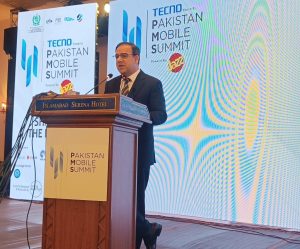Pakistan assembles around 9mln mobile phones worth$1.5bln in two years
 Caretaker Federal Minister for Information Technology and Telecommunication Dr Umar Saif said on Monday that the country had assembled approximately 9 million mobile phones worth around $1.5 billion during the last two years.
Caretaker Federal Minister for Information Technology and Telecommunication Dr Umar Saif said on Monday that the country had assembled approximately 9 million mobile phones worth around $1.5 billion during the last two years.
Addressing the Pakistan Mobile Summit, a first-ever mobile conference in the country, he said currently about 35 different mobile phone brands were actively contributing to the local mobile phone manufacturing industry.
He said the country had exported nearly 250,000 mobile phones and earned around $ 200 million dollars foreign exchange.
The minister said, local handset manufacturers in Pakistan have successfully produced around 57 million phones, surpassing the annual domestic demand of 25 million units.
The minister also informed the audience about efforts being made at the local level to prepare some components, with the goal of eventually manufacturing fully assembled phones within the country. He said that Pakistan is the 7th largest market of cellular users in the world with 191 Million cellular connections.
However, “we import most of our mobile phones. We need to manufacture them locally and develop an industry to export made-in-Pakistan phones” he added. “The Pakistani government has played a pivotal role in supporting the growth of this industry by offering various incentives” he added.
Dr. Saif said, “Just the number of broadband users in Pakistan is more than the entire population of Canada. The number of social media users in Pakistan is more than the entire population of many countries in Europe.”
Dr Umar Saif expressed optimism about the industry’s potential for growth and the positive impact on the country’s economy.
Highlighting the progress made in the IT and electronics industries over the last three years, he called for the formulation of policies in these domains.
He revealed that the government has decided to grant a 3% Research and Development (R&D) allowance to mobile manufacturers, scheduled to be implemented starting from the next fiscal year. Furthermore, the R&D allowance will be increased from 3% to 8% in the coming years, he added.
He expressed the view that this decision is expected to encourage and support local mobile manufacturers in their research and development endeavors. “The move aligns with the government’s broader strategy to boost the technology sector and promote self-sufficiency in the production of electronic devices within Pakistan.”
He expressed confidence that 5G services in the country would be launched by July-August of the current year, and a 300MHz spectrum would be offered for auction.
Before the launch of 5G services, the optic fiber network had to be enhanced. Currently, only 6,000 mobile towers are related to optic fiber cables (OFC) out of around 56,000 towers across the country.
The minister also highlighted the steps taken by his ministry for the uplift of the IT industry, stating that during the five months, the government has established a Telecom Tribunal to fulfill a longstanding demand of the telecom sector.
“The effective implementation of the Right of Way Policy, the Special Investment Council has removed all departmental hurdles, and all decisions in the interest of the country and the nation have been approved without delay,” he added.
He said that under the nation’s first space policy approved by the federal cabinet, international companies would be allowed to provide communication services through low-orbit communication satellites.
Dr Saif mentioned that satellite communication technology was advancing rapidly, and many private companies worldwide wanted to provide communication services through low-orbit satellites.
“Satellites used to be geostationary, far away from the land. They are useful for broadcasting TV signals, but communicating is difficult because there is latency,” he said.
Dr Saif said that communication services and internet services could be offered through low-orbit satellites, which were relatively closer. He mentioned that there had been a lot of development in this regard in the private sector.
“Now it has become possible for communication services in Pakistan to be provided through satellites, and the private sector has this technology,” he said.
The Pakistan Mobile Summit, the first-ever mobile conference in Pakistan, boasted a distinguished guest list of top industry leaders and over 250 attendees. The event provided an excellent platform for engaging in insightful discussions, sharing innovative ideas, and building collaborative networking within the dynamic landscape of the ever-evolving mobile industry.
This momentous evening gathered some pivotal figures in the mobile phone ecosystem, ranging from government representatives, operators, regulators, manufacturers, and app developers to advocates for digital and financial inclusion (D&I) as well as sustainability.
Prominent names, including Muzzafar Hayat Piracha, CEO Airlink, Major General (R) Hafeez ur Rehman, Chairman PTA, Fatima Asad-Said, CEO ABACUS, Aamir Allawala, CEO Transsion TECNO Electronic, Muhammad Imran Saleem, Country GM, Careem Pakistan, Ehsan Saya, Managing Director, Daraz, Mr. Anwar Kabir, CEO Brand Spectrum, and others, graced this prestigious event.
Central to the discussions was the profound impact of 5G, exploring its transformative potential for digital advancements and B2B services, alongside other pertinent topics. Complementing the discussions, an exhibition area was set up to highlight the diverse contributions of organizations within the mobile industry.
This remarkable event has not only broken new ground but has also set a precedent for similar entities to come together, working collectively towards positive change in the mobile phone industry. It serves as a driving force for future initiatives, aiming to shape a more impactful and innovative trajectory for the industry.
Editor: Raja Kamran